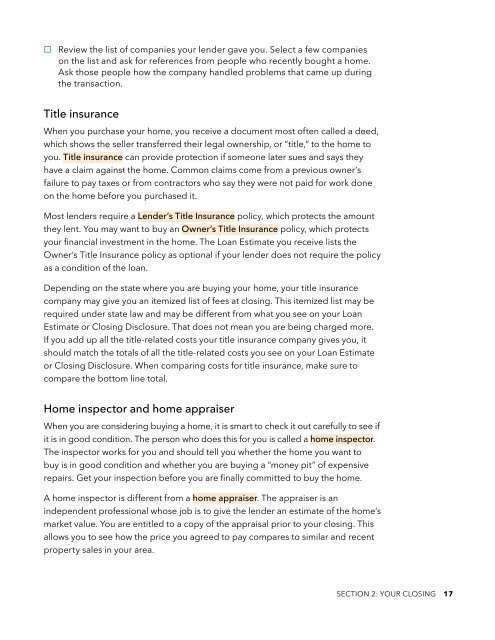Create successful ePaper yourself
Turn your PDF publications into a flip-book with our unique Google optimized e-Paper software.
Page 17<br />
¨¨<br />
Review the list of companies your lender gave you. Select a few companies<br />
on the list and ask for references from people who recently bought a home.<br />
Ask those people how the company handled problems that came up during<br />
the transaction.<br />
Title insurance<br />
When you purchase your home, you receive a document most often called a deed,<br />
which shows the seller transferred their legal ownership, or “title,” to the home to<br />
you. Title insurance can provide protection if someone later sues and says they<br />
have a claim against the home. Common claims come from a previous owner’s<br />
failure to pay taxes or from contractors who say they were not paid for work done<br />
on the home before you purchased it.<br />
Most lenders require a Lender’s Title Insurance policy, which protects the amount<br />
they lent. You may want to buy an Owner’s Title Insurance policy, which protects<br />
your financial investment in the home. The Loan Estimate you receive lists the<br />
Owner’s Title Insurance policy as optional if your lender does not require the policy<br />
as a condition of the loan.<br />
Depending on the state where you are buying your home, your title insurance<br />
company may give you an itemized list of fees at closing. This itemized list may be<br />
required under state law and may be different from what you see on your Loan<br />
Estimate or Closing Disclosure. That does not mean you are being charged more.<br />
If you add up all the title-related costs your title insurance company gives you, it<br />
should match the totals of all the title-related costs you see on your Loan Estimate<br />
or Closing Disclosure. When comparing costs for title insurance, make sure to<br />
compare the bottom line total.<br />
Home inspector and home appraiser<br />
When you are considering buying a home, it is smart to check it out carefully to see if<br />
it is in good condition. The person who does this for you is called a home inspector.<br />
The inspector works for you and should tell you whether the home you want to<br />
buy is in good condition and whether you are buying a “money pit” of expensive<br />
repairs. Get your inspection before you are finally committed to buy the home.<br />
A home inspector is different from a home appraiser. The appraiser is an<br />
independent professional whose job is to give the lender an estimate of the home’s<br />
market value. You are entitled to a copy of the appraisal prior to your closing. This<br />
allows you to see how the price you agreed to pay compares to similar and recent<br />
property sales in your area.<br />
SECTION 2: YOUR CLOSING 17


